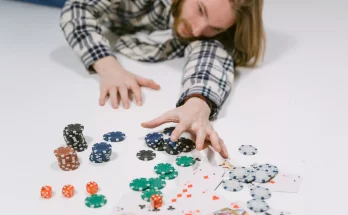Poker is a game in which people make mistakes, even pros, but what’s often the difference between winning and losing is spending time with those mistakes and reflecting on them.
Understanding mistakes can improve your judgment, you can weather a storm and give yourself a leg up on your competition. Here’s how it can work:
Identifying Mistakes
Poker players also make mistakes that are mistaken as strategic mistakes – when you have all the information and experience needed to make an educated decision but do not get it right, because you think or strategize the wrong way.
Afraid and insecurity, exhaustion and anger, overconfidence or just poor attentional skills can all lead to mistakes in daily activities, and you have to catch them fast enough to prevent them in the future.
Hence, it is very important that you do some rechecking of your hands after every session and make notes of what went wrong. This postmortem review can help you make better decisions and catch expensive errors. Beyond spot-the-spin, other experienced players can inspire you with suggestions for your own tactics.
Adapting Your Strategy
There is no such thing as a perfectly good decision in poker; even the best gamble. Do not cry about them and blame yourself for them, rather try to work on your strategy to circumvent them and outwit the other player.
And as with all poker play, it takes planning ahead of time to do prudent, slow work at the table. Do not rush out of the room when making big bets and raising preflop.
Attention to other players’ actions and modifying your strategy are also part of poker game success. Table talk, level of trust, and so on can be subtle markers of hand strength; change strategy accordingly to keep your opponents guessing while bringing you more hands!
All too often, players play ill at their best. If they’re fatigued, starving or sad, players cannot operate at their best levels, and fall down the slide into mediocrity and a streak of losing sessions. If you want to do it as well as possible, you need a clean head space so prep prior to each session and don’t let the rest of the universe decide.
Refining Your Decision-Making Skills
With your poker skills getting better, it is important to constantly practice making the right decision. This includes knowing the optimum way forward at the table in an instant, even in unfamiliar environments; and being aware of how opponents play and their strengths and weaknesses to better read and win.
The problem is, most players playing at micro-limit tables just learn so much and don’t have the time. They also often fail to look at the moves of their opponents as a valuable source of information they can leverage in games.
It takes a great deal of concentration and work to build a predictable strategy at the tables. Furthermore, being in the best of mind – don’t play when you’re stressed or angry – is important because it stops mistakes that could have been prevented had your head been clearer. Also, staying on track and accomplishing targets are more likely when strategy is done well.
Staying Positive
Thinking well is a key to poker. When you look at the bright side, you’re able to make progress faster, recover quicker from mistakes, and think in long-term terms that give you the best opportunity for profit.
Pro poker players follow their own fitness regimes and food regimens in order to remain mentally sharp during a game. They can also be kept on the right path to absorbing information from each hand they see.
Remind yourself that poker is a game – if you crash and burn in one round, the world will keep spinning and the sun will rise tomorrow. This mindset takes the pressure off of challenging decisions so you can focus on good ones rather than getting angry or stressed out and making costly mistakes.




